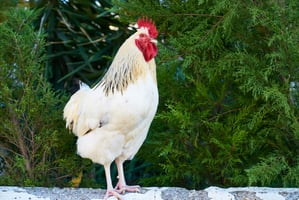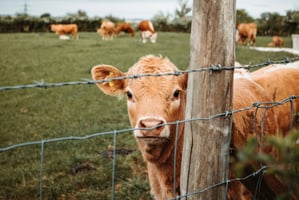When it comes to fencing options for livestock, security, or property boundaries, barbed wire and...
Choosing the Right Fencing Material for Powered Fences: Poly Wire, High Tensile, and Low Tensile Wire Explained
Choosing the Right Fencing Material for Powered Fences: Poly Wire, High Tensile, and Low Tensile Wire Explained
When it comes to securing your property, whether it's a farm, garden, or livestock area, selecting the right type of fencing material is essential for ensuring effective protection. One of the key factors in building a functional and durable fence is choosing the appropriate wire. The three most common types of wire used in powered electric fencing are poly wire, high tensile wire, and low tensile wire. Each has its unique properties, applications, and considerations.
In this blog post, we'll explain the differences between these types of wire, their applications for fencing, and what you should consider when choosing the best option for your electric-powered fence.
What is Poly Wire?
Poly wire is a modern, lightweight option for electric fencing made from a combination of polypropylene or other synthetic materials, with embedded metal strands (typically stainless steel or galvanized steel). The primary benefit of poly wire is its ease of use and installation—it’s lightweight, flexible, and highly visible, making it ideal for both temporary and permanent fencing solutions.
Applications of Poly Wire:
- Temporary Fencing: Poly wire is often used for temporary fencing, such as when rotating livestock through pasture or protecting garden areas.
- Portable Fencing: Ideal for creating portable, movable enclosures that require flexibility.
- Garden Fencing: Poly wire’s visibility makes it great for deterring pets or wildlife without causing harm.
- Livestock Fencing: Poly wire is commonly used in rotational grazing systems for cattle, sheep, goats, and horses.
Pros of Poly Wire:
- Lightweight and easy to install: Ideal for quick setups or areas requiring frequent movement.
- Highly visible: The bright color makes it visible to both animals and people.
- Corrosion-resistant: Poly wire resists rust and corrosion, ensuring long-term durability.
- Affordable: Generally more cost-effective than metal wire options.
Cons of Poly Wire:
- Less durable than metal wire: While durable, poly wire is not as tough as high or low tensile wire.
- Lower conductivity: It tends to have slightly lower conductivity than metal wires, although this can be mitigated with multiple metal strands.
What is High Tensile Wire?
High tensile wire is a high-strength steel wire that is specifically designed to endure high tension. This type of wire is made to withstand significant amounts of force without breaking or stretching, which makes it a long-lasting and robust option for permanent fencing solutions.
Applications of High Tensile Wire:
- Permanent Fencing for Livestock: High tensile wire is ideal for permanent enclosures for larger animals such as cattle, horses, and goats, where durability and tension are essential.
- Large-Scale Fencing: Suitable for long stretches of fencing, such as around pastures or large garden plots.
- High Security Areas: Great for areas where animals may be prone to attempting to break through the fence.
Pros of High Tensile Wire:
- Strength and Durability: High tensile wire is extremely strong and resistant to wear and tear. It doesn't stretch over time like low tensile wire.
- Long-Term Investment: Due to its strength, it requires less maintenance and lasts much longer than other types of wire.
- High Voltage Conductivity: High tensile wire provides excellent conductivity, making it ideal for electric fencing systems.
Cons of High Tensile Wire:
- Higher Cost: It is generally more expensive than poly or low tensile wire.
- Harder to Work With: Due to its strength, high tensile wire requires special tools and more effort to install and maintain.
- Needs to Be Tensioned Correctly: If not installed with the correct tension, high tensile wire can lose its effectiveness.
What is Low Tensile Wire?
Low tensile wire, made from softer, more malleable steel, is less resistant to stretching and breaking compared to high tensile wire. While it is stronger than poly wire, it is not as strong as high tensile wire. Low tensile wire is commonly used for lighter-duty fencing applications.
While low tensile wire can be used for an electric fence, it generally isn't the best choice for long-term, high-performance applications, especially if you’re using the fence to contain large or strong animals. Here’s why:
Applications of Low Tensile Wire:
- Smaller Livestock: Suitable for small to medium-sized animals such as sheep, pigs, or poultry.
- Temporary or Semi-Permanent Fencing: Low tensile wire is a good option for temporary fencing or areas where less frequent maintenance is expected.
- Garden Fencing: Useful for keeping smaller wildlife out of gardens, but not as ideal for larger animals like deer or cattle.
Pros of Low Tensile Wire:
- Easier to Work With: Due to its flexibility, low tensile wire is easier to install and maintain compared to high tensile wire.
- Cost-Effective: Typically more affordable than high tensile wire, making it a budget-friendly option.
- Good for Small Fencing Projects: Well-suited for smaller or less demanding applications.
Cons of Low Tensile Wire:
- Not as Durable: Low tensile wire is more prone to sagging and breaking over time, especially under heavy tension.
- Requires More Maintenance: It may need to be re-tensioned or replaced more frequently than high tensile wire.
- Lower Conductivity: It is less efficient at conducting electricity compared to high tensile wire and as such, is not recommended for powered fence chargers.
What Should You Consider When Choosing Fencing Wire for Powered Fencing?
When choosing the best type of wire for your powered fence, several factors should influence your decision:
1. Type of Animals You’re Fencing In or Out
- Large Animals (e.g., cattle, horses, or deer) require strong, durable fencing to keep them contained or out of your garden. In this case, high tensile wire is the best option due to its strength and long-lasting durability.
- Smaller Animals (e.g., chickens, sheep, or rabbits) can often be managed with poly wire or low tensile wire, as these animals don’t exert as much force against fences.
2. Temporary vs. Permanent Fencing
- If you need a temporary fence, poly wire is often the best choice due to its portability and ease of setup.
- For permanent fencing, high tensile wire is generally the preferred option due to its strength and durability over the long term.
3. Location and Environment
- Consider the climate and environment in which the fence will be located. Poly wire performs well in mild weather and areas where flexibility is needed. In harsher climates or areas with high animal traffic, high tensile wire offers superior durability.
4. Budget
- Poly wire is the most affordable option, making it ideal for smaller projects or budgets.
- If you’re working on a larger-scale or permanent fencing project, high tensile wire will likely be more expensive but could be more cost-effective in the long run.
Conclusion: Selecting the Right Fence Wire for Your Needs
When setting up a powered fence, choosing the right wire is crucial for ensuring the fence functions as intended while remaining durable and safe. Poly wire is an excellent choice for temporary fencing or smaller applications, while high tensile wire provides the best durability and strength for larger animals or permanent setups. Low tensile wire offers a more affordable and easier-to-install solution for lighter-duty fencing needs.
By considering your specific requirements—such as the type of animals you’re fencing in or out, the expected lifespan of the fence, and your budget—you can make an informed decision that will keep your property secure and your livestock safe for years to come.


